Devon Trevarrow Flaherty's Blog, page 78
May 2, 2013
The Newest Loser
Well, I suppose that I knew it was coming. Or, in other words, you can’t win them all.
As part of my marketing and publicity strategy (I am very new to this), I am entering Benevolent into various book competitions throughout the year and even around the globe. It is the single-most expensive part of producing and marketing the book, but I am really hoping for some sort of recognition to help boost sales and bring insta-credibility to the book. (Note: Contests for books that are indie- or self-published are fewer than for those traditionally published, but I started with lists online by bloggers and journalists claiming the “best” contests for a indie/self-pub to enter. In the end we are looking at maybe fifteen over twelve months).
And while the results will be coming in from now until more than a year from now, the first contest happened to have a solid announcement date (meaning, not “sometime after the first of July,” but “Monday, April 29″). So, of course, I was sitting at my computer every free m oment I had all that day, refreshing the awards page over and over and over. Then they gave a time! So I came back. Then they were late! And I sat around refreshing. Then they only did a partial announcement! And my categories were left for the next day, at least. So for a couple more days I did this until I finally accepted that, boo-hoo, my name was not going to pop up for this year’s IPPY for the Midwest Region or Literary Fiction.
oment I had all that day, refreshing the awards page over and over and over. Then they gave a time! So I came back. Then they were late! And I sat around refreshing. Then they only did a partial announcement! And my categories were left for the next day, at least. So for a couple more days I did this until I finally accepted that, boo-hoo, my name was not going to pop up for this year’s IPPY for the Midwest Region or Literary Fiction.
And now I’m doing the whole “crap” thing. Have I made the right decision? Have I wasted a whole lot of money? Did I mail the entry right? Did I choose the right categories? Do I really think my book stands a chance? Is the book worth the paper it’s printed on? All the time and energy and even love I have put into it? Who am I kidding?
But I have to admit that while quite disappointed, I am not (at least for the most part) groping in the dredges of the fridge for old chocolate shavings and slumping onto the couch in front of the telly. In fact, the number one thing that I want to do right now is write. I want to write the next book, the next big thing, the one that will show them! Because I know that judging is highly subjective and I know that I can write well and I can be professional and, most importantly, I am going to keep working at this thing. There is no end to this job, this work of promoting and writing and then promoting and writing. And I wouldn’t want there to be.
But I’m starting to get off on a subject that I am covering next week for Catherine Ryan Howard’s blog, Catherine Caffeinated. So I’ll shut down for the night and–what else?–write another few pages on The Family Elephant’s Jewels, a 2014 IPPY hopeful.


May 1, 2013
What It Feels Like
Time for an April synopsis!
B efore we get all entertainment here, let’s acknowledge that this was the month I received my first paycheck as a novelist and entrepreneur of Owl and Zebra Press. Createspace, Kindle, and Smashwords (which, between the three, distribute to all my other sales venues) take one, two, or even three months to send a paycheck for the current month. So they are all still holding out on me. But the local bookshop, The Regulator, is not. The day after I had my reading and left them with extra signed copies, I swung by and picked up the check. And I got more than the check: the owner had very kind things to say both about the production of the book and also our possible future together. Now, isn’t that nice?
efore we get all entertainment here, let’s acknowledge that this was the month I received my first paycheck as a novelist and entrepreneur of Owl and Zebra Press. Createspace, Kindle, and Smashwords (which, between the three, distribute to all my other sales venues) take one, two, or even three months to send a paycheck for the current month. So they are all still holding out on me. But the local bookshop, The Regulator, is not. The day after I had my reading and left them with extra signed copies, I swung by and picked up the check. And I got more than the check: the owner had very kind things to say both about the production of the book and also our possible future together. Now, isn’t that nice?
As for April and non-book entertainment.
Ugly Betty (TV series, 2006-2010). Finished! So sad. I previously said that Betty has five or six seasons. Boy, was I wrong. Due to low ratings, they cut it off short at four. Actually, five or six would have been perfect to bring all lines to conclusion, but–as much as I love Betty–ending after four forced the writers to put it into an uncomfortable overdrive. All of a sudden Betty’s a fashionable hottie and this person’s married and that person’s deep and that person’s nice… well, you get the picture. It was already happening slowly on its own, but… I’m repeating myself in a slow lament. I do still love Betty. And Amanda (laugh out loud!). And I also really relate to Betty’s struggle to make choices that hang–sometimes precipitously–between her dreams, her morals, her talents, and her family.
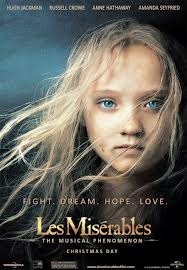 Les Miserables (2012). Les Mis is one of my favorite books and favorite musicals (and we all know how much I love books and musicals). I was slated to go see this movie version with a good friend at the theater (gasp!–can a mom do that?), but, alas, a mom can’t do that. So as soon as Redbox sent a message to my email inbox reminding me it had arrived for rental, I shot out to claim it for 24 hours. Now, I was folding laundry and not staring rapturously at the flat screen, but I was not as impressed as I wanted to be. I did enjoy it, but I have to say I like the book, the Broadway musical (in it’s live form) and the 1998 version of the film better. In the past, I have complained that the 1998 version did not have Eponine or any of the soaring musical score and also underplayed the Revolution in the story, but I take it all back. That former version captured something more of the soul of the Victor Hugo creation and is, in my opinion, more fit for a screen venue. (Sure, the 2012 version’s acting and cinematography were awesome (where the vocals often lacked), but I have said my piece.)
Les Miserables (2012). Les Mis is one of my favorite books and favorite musicals (and we all know how much I love books and musicals). I was slated to go see this movie version with a good friend at the theater (gasp!–can a mom do that?), but, alas, a mom can’t do that. So as soon as Redbox sent a message to my email inbox reminding me it had arrived for rental, I shot out to claim it for 24 hours. Now, I was folding laundry and not staring rapturously at the flat screen, but I was not as impressed as I wanted to be. I did enjoy it, but I have to say I like the book, the Broadway musical (in it’s live form) and the 1998 version of the film better. In the past, I have complained that the 1998 version did not have Eponine or any of the soaring musical score and also underplayed the Revolution in the story, but I take it all back. That former version captured something more of the soul of the Victor Hugo creation and is, in my opinion, more fit for a screen venue. (Sure, the 2012 version’s acting and cinematography were awesome (where the vocals often lacked), but I have said my piece.)
 Anna Karenina (2012). And another book movie. This one was the opposite of Les Mis in that it impressed me when I did not expect to be impressed. I was honestly expecting it to be sort of sordid, but it wasn’t as bad as it looked on the previews. So then why was I watching? In the mood for something sordid? I consider Anna Karenina, the book, to be like a Russian cousin to the Jane Austen-esque novels, and while I have enjoyed those over the years (and many of their movies), I have never been able to get through Anna (the novel). I seem to get bored reading Russian lit. So I wanted to like it and to get a feel for the Karenina story. What I was happy to discover–contrary to where I thought the novel was headed when I have tried to read it–was that the movie did not simper around Anna’s liberation as a sexual being and a woman. Sure, she’s passionate and strong-willed and part of a restrictive society, but she is also selfish and stands in stark contrast to the calmer, more sacrificial love of Levin and Kitty. We aren’t convinced, in the end, that she is the best mom (understatement) and we also agree with Anna that her husband, the forgiver and loyalist, is the better person. And I forgot to mention that the movie is done so that you are acutely aware of the movie as creation; plenty of time the the acting takes place in a theater set, characters passing between acts. I’m not really sure why the director took this direction, but it was beautiful and reminded me a lot of Baz Luhrman.
Anna Karenina (2012). And another book movie. This one was the opposite of Les Mis in that it impressed me when I did not expect to be impressed. I was honestly expecting it to be sort of sordid, but it wasn’t as bad as it looked on the previews. So then why was I watching? In the mood for something sordid? I consider Anna Karenina, the book, to be like a Russian cousin to the Jane Austen-esque novels, and while I have enjoyed those over the years (and many of their movies), I have never been able to get through Anna (the novel). I seem to get bored reading Russian lit. So I wanted to like it and to get a feel for the Karenina story. What I was happy to discover–contrary to where I thought the novel was headed when I have tried to read it–was that the movie did not simper around Anna’s liberation as a sexual being and a woman. Sure, she’s passionate and strong-willed and part of a restrictive society, but she is also selfish and stands in stark contrast to the calmer, more sacrificial love of Levin and Kitty. We aren’t convinced, in the end, that she is the best mom (understatement) and we also agree with Anna that her husband, the forgiver and loyalist, is the better person. And I forgot to mention that the movie is done so that you are acutely aware of the movie as creation; plenty of time the the acting takes place in a theater set, characters passing between acts. I’m not really sure why the director took this direction, but it was beautiful and reminded me a lot of Baz Luhrman.
 The Croods (2013). Saw this at a movie theater in Michigan with my family and the kids. I never would have seen it based on the previews, but since kids movie options are so limited, I just about end up watching every family film that comes down the pike (or at least the major motion picture pike). Yay for having to go see this. I thought it was a great movie. There are some pretty obvious plot lines and all, but not only is the world the animators created beautiful and awe-inspiring, but the father’s love had me weeping before it was final credits. That, and it’s funny. Recommend.
The Croods (2013). Saw this at a movie theater in Michigan with my family and the kids. I never would have seen it based on the previews, but since kids movie options are so limited, I just about end up watching every family film that comes down the pike (or at least the major motion picture pike). Yay for having to go see this. I thought it was a great movie. There are some pretty obvious plot lines and all, but not only is the world the animators created beautiful and awe-inspiring, but the father’s love had me weeping before it was final credits. That, and it’s funny. Recommend.


April 30, 2013
Welcome.
You have found the Starving Artist blog and everything Devon Trevarrow Flaherty. Please follow the drop down menus to navigate around the page or just scroll down to read the blog. And why the moniker? See the first two blogs, A Meandering History of the Starving Artist and My Meandering History as a Starving Artist. And enjoy!


April 22, 2013
The Blog Post That Wasn’t
I have not been a fantasy fan for very long. It took a daughter who was very into The Chronicles of Narnia and then Harry Potter to change my averting, literary ways. And then I was handed a copy of The Once and Future King. Oh! Where have you been all my life, T. H. White?
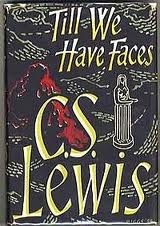 That means I’ve only got maybe four years of fantasy under my belt, as opposed to thirty of children’s books, twenty of middle and young adult, and up to fifteen of general and literary fiction, philosophy, biography, memoir, travel, etc. Unless you count my fourth grade love of Madeline L’Engle’s A Wrinkle In Time, which should have been a clue. I didn’t solve that clue.
That means I’ve only got maybe four years of fantasy under my belt, as opposed to thirty of children’s books, twenty of middle and young adult, and up to fifteen of general and literary fiction, philosophy, biography, memoir, travel, etc. Unless you count my fourth grade love of Madeline L’Engle’s A Wrinkle In Time, which should have been a clue. I didn’t solve that clue.
And then there’s Till We Have Faces: A Myth Retold. I didn’t think about it being fantasy when I read it for a college seminar. I just knew that I loved that book. But while virtually every other book I have ever loved can be found on some bests list somewhere, I never see Faces mentioned. Go ahead and look up C. S. Lewis. The very last book under his name is always going to be Till We Have Faces. (Okay, so I can’t claim that definitively, but you get the point that whenever I mention it, no one knows what I’m talking about.)
And while I loved to snuggle with my little daughter and read through the Chronicles, they (nor the Space/Cosmic Trilogy beginning with Out of a Silent Planet) were never going to be a favorite. The difference in writing style and, well, maturity between the works is obvious. Which is interesting, because that’s what Lewis thought, too. He considered Faces his most mature work, and actually, many Lewis fanatics consider it his best work, too.
I love it and I think you should give it a try. It’s a short book (my copy weighing in at 300 pages with giant margins). It is based on the Greek myth of Cupid and Psyche, as are such other stories as Beauty and the Beast and later derivative books like Spirited (Nancy Holder), Beastly (Alex Finn), and The Merchant’s Daughter (Melanie Dickerson ; and movies and TV series, as well). The myth stuck with Lewis from graduate school on, and he kept the book idea in his head for more than thirty-five years, writing parts in verse during the long wait.
I’m pretty sure I’ll get to writing fantasy before thirty-five years of rumination. Or maybe I hope so. Because, like Lewis, I have heard the siren call of a fantastical story and it’s floating around up there in my brain. My first novel, Benevolent, is literary in nature, but includes bits of magic realism in the form of fictional legend. But in about a year (yes, I do schedule goals that far ahead) I plan to be writing full-time on my third book, the start of a fantasy trilogy, Spin (2015). What? Me? A fantasy trilogy? Absolutely. And who knows? Maybe it will be my most celebrated work, as well; Una has everything she ever wanted in Henry and in her life in Urbania, until Peter comes along and threatens to take it all away by revealing the truth behind an old wives’ tale. Will Una answer the silent song of the Hidden Kingdom?
Maybe that’s why I like Lewis. He is an inveterate genre-bender. Besides a reader, a fantasy fan and an author, I want to be that, too.
__________
Here is the synopsis from the back cover of the A Harvest Book edition of Faces: “The timeless tale of two princesses—one beautiful and one unattractive—and of the struggle between sacred and profane love in C. S. Lewis’s reworking of the classical myth of Cupid and Psyche and one of his most enduring pieces of fiction.”
And more than that; it doesn’t just deal in generalizations, but is the compelling tale of an ugly young woman, her troubled family relationships, her respect for her teacher, and the dangerous journey she makes into a dark place to seek the truth.
*This post was written for a blog which later pulled my appearance due to a scheduling snafu. Thus, the title.


April 12, 2013
Cold Feet
 While growing up with dreams of becoming a career author, I have lived in my head the whole reading at a bookshop thing, countless times. As a reader, I have been to my fair share of book readings.
While growing up with dreams of becoming a career author, I have lived in my head the whole reading at a bookshop thing, countless times. As a reader, I have been to my fair share of book readings.
Apparently, most of you have not.
Book readings are a traditionally low-attendance affair. Now, I have been to a book signing where you had to purchase advance tickets and stand in a line that wrapped around the block. Right now, I have missed tickets for Michael Pollan. But I have also been to readings for famous authors where there were maybe five people in the audience. Sometimes, no matter how great your book, no one shows up.
It’s true, the Indy  Week was advertising my reading to thousands as the pick of the day, but here are the half-bleak, half-exciting stats:
Week was advertising my reading to thousands as the pick of the day, but here are the half-bleak, half-exciting stats:
I filled about 60 per cent of the seats, which–when accounting for people’s space peccadilloes–was about full.
I knew every single person in the audience, although stretched across family, friends, neighbors, and acquaintances.
I sold eight copies on the spot, which was enough to land me on the Regulator Bookshop bestsellers table.
Most of my best friends had other things going on and couldn’t make it, including work, strep throat, and a flight from England.
I was pretty much terrified. Apparently I read slow and clear enough, but I absolutely could not muster the emotion I normally have while reading at home, to my mirror. I also cut off the questions, on accident, because I thought a nonexistent pause was really a long one.
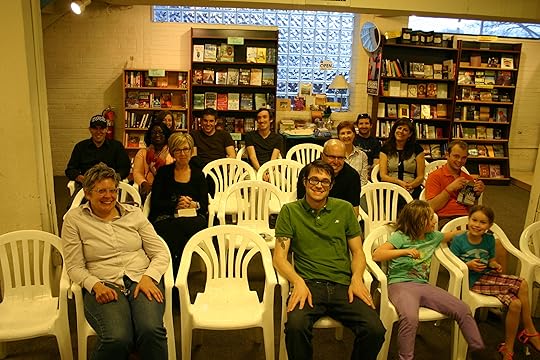 To put this in perspective; as a new author, my good attendance and great sales brought me to the attention of the shop owner, who seems optimistic about needing to make future orders with me, and is also pushing the book in prominent places. Also, I now have confirmed to myself that reading tours are not “where it’s at” (not to write them off completely), and that I need to work on my reading skills.
To put this in perspective; as a new author, my good attendance and great sales brought me to the attention of the shop owner, who seems optimistic about needing to make future orders with me, and is also pushing the book in prominent places. Also, I now have confirmed to myself that reading tours are not “where it’s at” (not to write them off completely), and that I need to work on my reading skills.
And it’s true, I took a photo of my audience. I think that will be my thing.


April 9, 2013
Blog Tour Underway
Join us as Devon tours around the internet, with giveaways, interviews, guest blogs, and promotions. See the Info => Events tab for exciting details.


Buy Benevolent
Want a copy of your very own? Buy Devon’s coming-of-age, magic realism, literary fiction novel from Amazon, Barnes & Nobel, or Diesel, or get your ebook from just about anywhere. See Books => Buy Books tab for more info.


April 7, 2013
Book Review: The Purpose Driven Life
The Purpose Driven Life: What On Earth Am I Here For?, Expanded and Large Print Edition, by Rick Warren and published in 2002 by Zondervan.
I am going to have to begin this review with two stories.
F irst story: I never intended to read this book. As a protestant, evangelical Christian, I come across it all the time, but, like I said, I never intended to read it. Why? It’s pretty simple, if not a bit strange. First, the title. Anyone else think it sounds like a bad, self-help, motivational book? Second, I have a very hard time connecting with Rick Warren. Again, as a protestant, evangelical Christian, I come across Rick Warren all the time, and not least of all because I am involved with Celebrate Recovery, a 12-step program started by his church in California, whose curriculum is heavily influenced by him. Let me be clear: I have nothing against him. We just don’t think the same. Half the time he asks a question and I don’t know what he’s asking, or he uses some teaching technique that just doesn’t work for me. We’re on different pages, mentally.
irst story: I never intended to read this book. As a protestant, evangelical Christian, I come across it all the time, but, like I said, I never intended to read it. Why? It’s pretty simple, if not a bit strange. First, the title. Anyone else think it sounds like a bad, self-help, motivational book? Second, I have a very hard time connecting with Rick Warren. Again, as a protestant, evangelical Christian, I come across Rick Warren all the time, and not least of all because I am involved with Celebrate Recovery, a 12-step program started by his church in California, whose curriculum is heavily influenced by him. Let me be clear: I have nothing against him. We just don’t think the same. Half the time he asks a question and I don’t know what he’s asking, or he uses some teaching technique that just doesn’t work for me. We’re on different pages, mentally.
I was only somewhat surprised, then, when I went online to purchase the book and (no joke) couldn’t figure out which version was which and what exactly I wanted to purchase. It seems he has updated the old version, and in so doing, didn’t just change the cover, but also made the old subtitle more prominent than the old title. That, and there are numerous books related to The Purpose Driven Life; like journals and curriculum for small groups. Utterly confused, I ended up buying the ONLY edition that stated clearly in the synopsis that it was, indeed, the updated version on The Purpose Driven Life.
It arrived in the mail and, much to my chagrin, was the large print edition. Sigh.
Second story: If I am going to be reviewing Christian (and other religious books), it is going to be apparent that I am a Christian, or at least you should be disclaimed of it. This is what that means to me.
I grew up in the church (namely The Salvation Army), and my great aunt was a minister. We were oftentimes in the church building, and I was active in the choir, the Sunbeams (think Christian Brownies) and Girl Guards (think Christian Girl Scouts), as well as Junior Soldiers. I prayed what is known as the sinner’s prayer at age four, and asked Jesus to forgive my sins and come be my Lord. I have had years of doubt and of struggle and pain over the past thirty years, but God has remained my God and I still believe wholeheartedly that Jesus is His son and the Bible is His revelation (and everything else in the Nicene Creed). God, Jesus, and the Holy Spirit are a part of my daily life, my relationships, and my family life. My passions include meeting others in their needs and struggles and telling them about the freeing love and forgiveness of the Creator of the Universe.
Enough stories. Review.
If you did not know, only just over ten years into its being, The Purpose Drive Life is the best-selling hard-back book in all history. It has spawned a business, a curriculum, and a number of co- materials. I’m not exactly sure who is reading it, but I’m going to venture that a large portion of them are evangelical Christians.
So now that we know that this book is not a poor, self-help book, what is it? It is nonfiction. It is religious. The main question of the book is, of course, “What On Earth Am I Here For?” And the book answers that question to the tune of five purposes that mold into one. Of course, it does this from the standpoint of protestant Christianity, and using Biblical scripture. It covers a lot of ground very quickly, but somehow cuts to the quick in many of the areas it addresses. In a way, then, it’s a primer for the Christian life, working with the Bible as a modern day manual or guidebook that addresses the most basic of operational questions.
Having grown up as both an academic and a Christian, I didn’t expect this book to hold a whole lot of “aha” moments for me. I also expected that it would be written… well… woodily. Happily, neither of these assumptions proved to be true. It is a book that you could come back to time and time again and glean things from. Even if not a Christian, there are certainly wise things to be read here, but taking only those things would completely miss the point of the book. Because, in the end, this book is not for the faint of heart. If one were to accept his premises (and what basic premises they are), it would require a radical makeover (for almost all of us).
So I would recommend this book for Christians of all stripes and maturity, for people looking for the meaning of life, and for people wondering if they believe in God/Jesus. If you like it/believe it, it could change your life.
And as a note, it is written to be read in sections for forty days. This would be a good way to do it (or in a group, as suggested) but I was reading faster since I was reading it for review.
Here are some quotes:
“The most common myth about money is that having more will make me more secure. It won’t” (p39).
“…one key of failure is to try to please everyone (p39).
“The power of focusing can be seen in light. Diffused light has little power or impact, but you can concentrate its energy by focusing it. With a magnifying glass, the rays of the sun can be focused to set grass or paper on fire. When light is focused even more as a laser beam, it can cut through steel (p43).
“Life on earth is a trust” (p58).
“The abundant life has nothing to do with material abundance, and faithfulness to God does not guarantee success in a career or even in ministry. Never focus on temporary crowns” (p67)
“The ultimate goal of the universe it to show the glory of God. It is the reason for everything that exists, including you” (p71).
“When anything in creation fulfills its purpose, it brings glory to God” (p73).
“Living the rest of your life for the glory of God will require a change in your priorities, your schedule, your relationships, and everything else. It will sometimes mean choosing a difficult path instead of an easy one” (p75-76).
“One of the greatest gifts God has given you is the ability to enjoy pleasure. He wired you with five senses and emotions so that you can experience it. He wants you to enjoy life, not just endure it” (p82).
“Every act of enjoyment becomes an act of worship when you thank God for it” (p96).
“Sometimes it takes years, but eventually you discover that the greatest hindrance to God’s blessing in your life is not others, it is yourself–your self-will, stubborn pride, and personal ambition” (p107).
“To instruct us in candid honesty, God gave us the book of Psalms–a worship manual, full of ranting, raving, doubts, fears, resentments, and deep passions combined with thanksgiving, praise, and statements of faith” (p123).
“Great opportunities may come once in a lifetime, but small opportunities surround us every day” (p125).
“…sincerity alone is not enough. You can be sincerely wrong” (p132)
“Will I use my energy and emotions for retaliation or for resolution? You can’t do both” (p183).
“It is a sacrifice to patiently absorb the anger of others, especially it it’s unfounded. But remember, this is what Jesus did for you” (p201).
“For the sake of fellowship, you must destroy your arsenal of relational nuclear weapons, including condemning, belittling, comparing, labeling, insulting, condescending, and being sarcastic” (p203).
“Many are afraid to commit to anything and just drift through life. Others make halfhearted commitments to competing values, which leads to frustration and mediocrity. Others make a full commitment to worldly goals, such as becoming wealthy or famous and end up disappointed and bitter” (p230).
“We miss many occasions for serving because we lack sensitivity and spontaneity” (p331).
“Jesus specialized in menial tasks that everyone else tried to avoid: washing feet, helping children, fixing breakfast, and serving lepers. Nothing was beneath Him, because He came to serve. It wasn’t in spite of His greatness that He did these things, but because of it” (p333).
“At some point in your life you must decide if you want to impress people or influence people” (p355).
“God has never made a person He doesn’t love. Everyone matters to Him” (p377).
“The expectations of others will box you in, limit your potential, and keep you from fulfilling the dream God placed in you heart to fulfill” (p427).
“…there will always be those who will demean how you look, dislike what you do, disapprove of what you believe, dispute what you say, and disrespect who you are. But they cannot control your emotions unless you let them” (p432).


March 31, 2013
Stuck On You
Well, since I am starting to read books for review on this blog, I am going to refrain from telling you about that, in the monthly review. There will still be other media and things that cross my path, however. Here are some reviews and things from March.
 Bernie (movie, 2011 ). We rented this movie on the recommendation of a couple friends, and were pleasantly surprised. In my opinion, it’s not a watch again movie, but it was definitely worth the first watch. Honestly, the less you know about this movie before you watch it, the better, except that it’s based on a true story. It might be considered a black comedy, but is mostly small town drama.
Bernie (movie, 2011 ). We rented this movie on the recommendation of a couple friends, and were pleasantly surprised. In my opinion, it’s not a watch again movie, but it was definitely worth the first watch. Honestly, the less you know about this movie before you watch it, the better, except that it’s based on a true story. It might be considered a black comedy, but is mostly small town drama.
 Ugly Betty (TV series, 2006-2010). I told myself that once I pushed through the publication of Benevolent, I would reward myself by re-claiming some of my evenings and watching Betty from the first episode on. I am a Betty fan, but I have never seen the whole series. As of April, I am almost half-way through the six season series. Betty has always seemed to garner plenty of accolades, so I don’t know what I can add to that. It’s based on a Hispanic soap opera, but has a very distinct American flare (no pun intended). It has been lauded for its use of a atypical, non-anorexic main character, for its acting, for its seamless (if not overwrought, on purpose) plot lines, for its lovable characters, and for its morality tales (found often in the immorality). I appreciate all this and the fashion and the lack of graphic scenes and the fact that Betty is the low woman on the totem pole, clawing her way with character and talent to the top. Sound familiar?
Ugly Betty (TV series, 2006-2010). I told myself that once I pushed through the publication of Benevolent, I would reward myself by re-claiming some of my evenings and watching Betty from the first episode on. I am a Betty fan, but I have never seen the whole series. As of April, I am almost half-way through the six season series. Betty has always seemed to garner plenty of accolades, so I don’t know what I can add to that. It’s based on a Hispanic soap opera, but has a very distinct American flare (no pun intended). It has been lauded for its use of a atypical, non-anorexic main character, for its acting, for its seamless (if not overwrought, on purpose) plot lines, for its lovable characters, and for its morality tales (found often in the immorality). I appreciate all this and the fashion and the lack of graphic scenes and the fact that Betty is the low woman on the totem pole, clawing her way with character and talent to the top. Sound familiar?
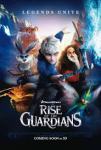 Rise of the Guardians (movie, 2012). Not a fan of the title. For one, I had it confused with Legend of the Guardians: The Owls of Ga’Hoole, which is an awful title. And not at all related. We went to see it because it was at the two-buck theater and the kids wanted to see it. I was pleasantly surprised. This movie will go down on my list of best kids’ movies of the year. It was funny, it was insightful (with meanings that could even be stretched to philosophy or religion), and it was entertaining.
Rise of the Guardians (movie, 2012). Not a fan of the title. For one, I had it confused with Legend of the Guardians: The Owls of Ga’Hoole, which is an awful title. And not at all related. We went to see it because it was at the two-buck theater and the kids wanted to see it. I was pleasantly surprised. This movie will go down on my list of best kids’ movies of the year. It was funny, it was insightful (with meanings that could even be stretched to philosophy or religion), and it was entertaining.
Also of note, this month; I published my first novel, Benevolent, in paperback form (ebook was last month) through my new, indie publishing company, Owl and Zebra Press. I kept the paperback availability on the down-low until March 18, when I launched, announcing its availability on the internet. The whole thing was a (small, virtual) three-ring circus, including custom tee-shirt giveaways, books giveaways, a Q & A session, guest blogs (still ongoing), author interviews, and announcements on Facebook, Twitter, and blogs. I am surprised, one weekend during the festivities, when an article about the book appears as the headliner for the D section of the Herald Sun.


March 25, 2013
Book Review: Harmonies of the World
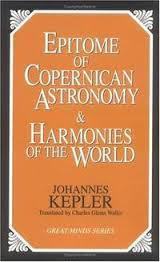 Epitome of Copernican Astronomy & Harmonies of the World, by Johannes Kepler, translated by Charles Glenn Wallis, and published in 1995 by Prometheus Books for its Great Mind Series. (The goal was only to read Harmonies, and I read only parts of Epitome, when referenced.)
Epitome of Copernican Astronomy & Harmonies of the World, by Johannes Kepler, translated by Charles Glenn Wallis, and published in 1995 by Prometheus Books for its Great Mind Series. (The goal was only to read Harmonies, and I read only parts of Epitome, when referenced.)
When I ran the randomizer on my list of like a million books, I just knew the first one would be some technical doozy. And the Debbie Downer inside of me was not wrong. Oh well; plenty of enthusiasm for my new project of reading through a big chunk of the world’s best and most influential books, so I can do this! Remember, one of my rules was that I would make it through every book word-by-word except for technical tomes.
Right away, I learned something that I put to use. If I am going to read these kinds of books, I need to get annotated versions with explanations in close-to-laymans’ terms. Not only are Harmonies of the World‘s topics completely in fields that I don’t understand at this level (astronomy, math, and music theory), but the language usage is archaic and the history of the situation is lost on me. Therefore, I immediately ordered a preview copy of one of my next books–a Newton title–in its soon-to-be-released commentary version. Lesson learned.
Now, for the book itself.
I think we need to start with some history. Johannes Kepler was a key figure in the 17th century scientific revolution which included Isaac Newton’s theory of gravity, Galilieo’s world, Copernicus’ universe, and eventual shifts in the world of math, physics, astronomy, biology, medicine, and chemistry, which transformed our culture and views of nature. Kepler was officially a teacher and a mathematician to royalty, as well as an assistant to astronomer Tycho Brahe. He improved the telescope, married physics with astronomy (as opposed to astrology), and believed that “God had created the world according to an intelligible plan that is accessible through the natural light of reason” (“Johannes Kepler”, http://en.wikipedia.org/wiki/Johannes_Kepler).
Kepler’s first published work, Mysterium Cosmographicum, began his work as the updater of Copernican theory. After studying under Brahe and writing other works, he shifted his concentration to harmonies, or “music of the spheres,” which was an idea explored earlier by Pythagoras, Ptolemy, and many others. Music of the spheres is defined as “an ancient philosophical concept that regards proportions in the movements of celestial bodies—the Sun, Moon, and planets—as a form of musica (the Medieval Latin name for music). This ‘music’ is not usually thought to be literally audible, but a harmonic and/or mathematical and/or religious concept” (“Musica Universalis, http://en.wikipedia.org/wiki/Musica_universalis).
Kepler himself considered Harmonies of the World (aka. Harmony of the World or Harmonices Mundi) to be his greatest work. He certainly seems excited in his writing. The basic premiss is that there are harmonies, or congruence, in all of God’s creation, which Kepler limits in his proving to three-dimensional geometry (later known as Kepler’s solids), relationships of magnitude, music, and the Solar System. He builds his arguments on the Platonic Solids, irrational numbers (think pi), and harmonic intervals (like the ratio of a C to its octave and a fifth). Are there harmonic ratios in the distance between planets? Conclusion: no. How about their velocities? Well, yes, it does appear so, both individually and converging and diverging. And since movement best approximates music, this makes perfect sense to Kepler.
After Kepler sent Harmonies to the printer, his work came to another conclusion: “Kepler discovered that the ratio of the square of a planet’s period to the cube of its semi-major axis is constant for all orbits. Today, we know this relationship as Kepler’s Third Law. Many consider it to be one of the most elegant results in all of astronomy” (“Kepler’s Harmonices Mundi“, http://www.keplersdiscovery.com/Harmonies.html). Also, “when conjoined with Christian Huygens’ newly discovered law of centrifugal force it enabled [later, in the 1660s] Isaac Newton, Edmund Halley, and perhaps Christopher Wren and Robert Hooke to demonstrate independently that the presumed gravitational attraction between the Sun and its planets decreased with the square of the distance between them. This refuted the traditional assumption of scholastic physics that the power of gravitational attraction remained constant with distance whenever it applied between two bodies” (“Johannes Kepler”, http://en.wikipedia.org/wiki/Johannes_Kepler).
Kepler was not overly well received in the immediate. His theories were largely ignored by those in prominence in science. After some well-documented, third-party tests however, some scientists began pulling for a Keplerian model of astronomy. By 1630-1650, his was the most used textbook in astronomy, which set Kepler up to be the building block for Newtonian theory and its culmination in Principia Mathematica (which, by sheer coincidence, I will be reading this summer).
Besides all the boring numbers, the constant use of the run-on sentence, and the obvious issues with advances of science (like, he thinks there are only six planets and the universe orbits around the sun), it was interesting to witness his pure enthusiasm and conviction.
I would not recommend this book for reading, unless you are or are studying to be an astronomer, physicist, geometrician, science historian, or musical theorist. And if you really want to read it, accompany it with some sort of commentary or history. It consists largely of equations and “almost”s, stretching and fudging. (For example, Kepler says that because the earth sings “MI FA MI,” it is clear it is a place of MIsery and FAmine.) I think, with a much cleaner translation, it would be at least readable by the layman, but would still abound in equations. I think the following quotes will be enough for you:
“I commence a most sacred discourse, a most true hymn to God the Founder…. first to learn myself, and afterwards to teach others too, how great He is in wisdom, how great in power, and of what sort in goodness…. He can do by His unconquerable power all that He has decreed” (p169).
“…I brought it to light and found it to be truer than I had ever hoped, and I discovered among the celestial movements the full nature of harmony…” (p169).
“The very nature of things, in order to reveal herself to mankind, was at work in the different interpreters of different ages, and was the finger of God…” (p170).
“For the Creator, Who is the very source of geometry and, as Plato wrote, ‘practices eternal geometry,’ does not stray from His own archetype” (p177).
“…God has established nothing without geometrical beauty…” (p185).
“…they are doing nothing else in the business except to play the apes of God the Creator and to act out, as it were, a certain drama of the ordination of the celestial movements” (p198).
“Accordingly the movements of the heavens are nothing except a certain everlasting polyphony (intelligible, not audible) with dissonant tunings” (p208).





